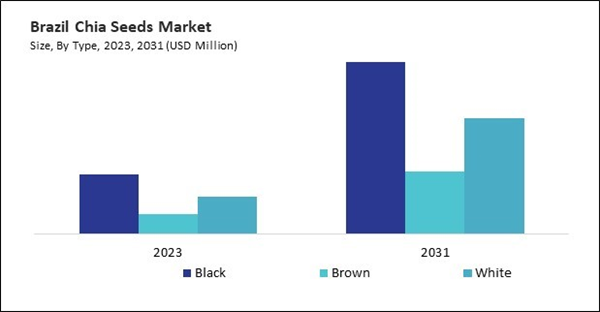Chia oil is derived from chia seeds and is rich in omega-3 fatty acids, particularly alpha-linolenic acid (ALA), making it a sought-after product for its heart health benefits. The oil is typically used as a supplement or in skincare products due to its anti-inflammatory properties. In culinary applications, chia oil is often used as a dressing for salads, drizzled over dishes, or added to smoothies. It provides a concentrated source of nutrients compared to whole seeds or ground forms, although it lacks the fiber content of the seed itself. Thus, in Brazil, 813.15 tonnes of Chia oil is expected to be utilized by the year 2031.
The Brazil market dominated the LAMEA Chia Seeds Market by Country in 2023, and is expected to continue to be a dominant market till 2031; thereby, achieving a market value of $65.7 Million by 2031. The Argentina market is registering a CAGR of 17.6% during 2024-2031. Additionally, the UAE market would capture a CAGR of 16.4% during 2024-2031.
Chia seeds may attract attention as a sustainable source of essential nutrients as more individuals become concerned about the environmental consequences of their dietary choices. Additionally, the rise of functional foods and dietary supplements presents an opportunity for chia seeds to be used in new and innovative products, such as protein powders, meal replacement shakes, and fortified snacks, which could help expand their market reach.
The market is also expected to benefit from the increasing popularity of personalized nutrition, which involves consumers pursuing foods that cater to their unique health requirements and preferences. As more people become interested in functional foods supporting specific health goals, such as weight management, improved digestion, or enhanced cardiovascular health, chia seeds could be a valuable addition to a customized dietary plan.
The increasing demand for chia seeds in South Africa can be attributed to the growth of health-focused retailers such as Wellness Warehouse and Dis-Chem. These retail chains have expanded their footprint across urban areas, making chia seeds available to more consumers. These stores focus on offering high-quality health products, and chia seeds have become a staple due to their rich nutrient profile. The South African government has supported the growth of the health sector, including retail, by promoting healthy eating through public awareness campaigns. This has created a favorable environment for health retailers to thrive, ensuring that superfoods like chia seeds reach more households. Therefore, the region will present lucrative growth opportunities for the market throughout the forecast period.
List of Key Companies Profiled
- Spectrum Organic Products LLC (Hain Celestial Group)
- Nutiva, Inc.
- Garden of Life, LLC (Nestle S.A)
- Glanbia PLC
- Navitas Organics
- Salba Smart Natural Products
- Mamma Chia LLC
- BENEXIA
- Royal Nut Company
- NOW Foods, Inc.
Market Report Segmentation
By Distribution Channel (Volume, Tonnes, USD Billion, 2020-2031)- Supermarkets/Hypermarkets
- Convenience Stores
- Online
- Other Distribution Channel
- Whole Chia
- Milled/Ground Chia
- Pre-hydrated Chia
- Chia Oil
- Black
- Brown
- White
- Brazil
- Argentina
- UAE
- Saudi Arabia
- South Africa
- Nigeria
- Rest of LAMEA
Table of Contents
Companies Mentioned
Some of the key companies profiled in this LAMEA Chia Seeds Market include:- Spectrum Organic Products LLC (Hain Celestial Group)
- Nutiva, Inc.
- Garden of Life, LLC (Nestle S.A)
- Glanbia PLC
- Navitas Organics
- Salba Smart Natural Products
- Mamma Chia LLC
- BENEXIA
- Royal Nut Company
- NOW Foods, Inc.









